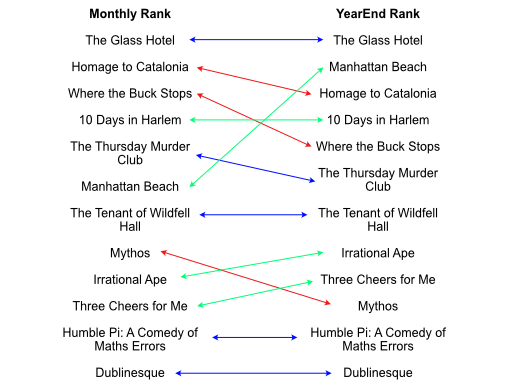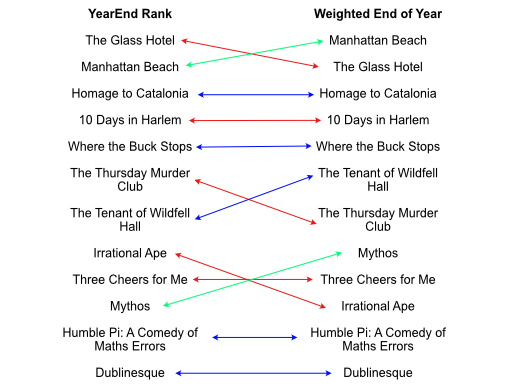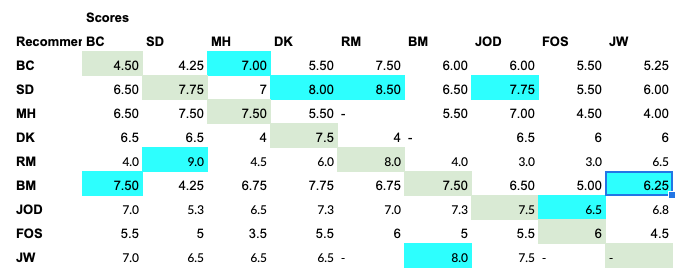
On what would pass a normal year, we always look forward to and end of year repast at a cosy cellar of the RIYC coutesy of one of our distinguished members. It’s a night of festive frivolity and likewise the very serious (;-) reflection on our years reads and selection of the book of the year. Superbly coordinated by our corresponding secretary and head gamesmaster, like the rest oif the world, we took the evening online. A Zoom EuroBookVision. A full cohort enjoyed a lovely evening with pre-selected and recommended wines and good cheer.
As we went into the end of year tabulations, our monthly reads were ranked according to the average scores offered immediately after reading. These were done the month they were read and our final December book was discussed and ranked prior to revealing the end of the year balloting. The Glass Hotel (pictured above) by Emily St. John Mandel achieved the highest score during the year. The monthly reads were ranked:
Following discussion, we turned to the highlight of the year – an opportunity to reflect and rank all of our reads in a Eurovision-style balloting system. The ballots were shared two weeks in advance and completed prior to the evening. In the full Eurovision experience, we gradually reveal from our lowest (1) choices to our final best choice of the year and the excitement builds. This year again, we ended up with a clear winner and as last year, the monthly highest-ranked is also our winner: Emily St John Mandel’s captivating the Glass Hotel. It was
The
- The Glass Hotel with a solid 74 points followed by
- Manhattan Beach at 68.
There were some winners and losers from our month to month rankings as the following chart shows, mapping the ranked scores from the 12 months against the year-end ranking.

This year we had 4 winners, 3 losers and 5 holders. The top finishing book ‘The Glass Hotel’ won both the monthly and yearly tabs. Manhattan Beach was the big winner at the end of the year jumping 4 full places – on recollection, it appears to have struck a chord – feel free to discuss. Irrational Ape moved from 9 to 7 and Three Cheers for Me also managed a subtle increase in appreciation at the end of the year – some gratification for me 😉 Losers dropped multiple ranks but Dublinesque held fast at the bottom of the pack- as did our low place pick for the last two years.
One factor that we are always conscious of is the fact that the books read earlier in the year have to either be memorable to battle it out lest they suffer from a more recent familiarity with good (or in fairness bad) reads later in the year that may receive an unintentional bump based on our faltering memories. To try a little exercise in controlling for this I gave some slight weighting +/- up to 25% of point score in the final meeting based on the reading sequence. Interestingly the top two books swap places. There is one other big winner with Mythos jumping substantially based on the potential that we may not have remembered and ranked it as high. Interestingly there were more books that slipped based on the potential that we remembered them better and they had to be less memorable. I think this also reflected a throw-away comment during the evening that ‘I don’t remember even reading that book’ and the potential that it could be left unranked.

Interestingly we actually had higher average scores this year despite a repeated note that we just didn’t seem to be as reading as much quality this year as we did in the past. In point of fact, for what we might make of it we had a much lower StdDev on our monthly rankings this year 1.17 vs 1.44 last year. This year we only had one month StdDev >2 (Three Cheers) whereas last year we had three months with a StdDev >2 – so maybe we feel we are challenging ourselves with contentious reading?
So how did we fare between Fiction and Non-Fiction? We continued past years trend and favour our Non-Fiction reads on a month by month basis. Our average score for Non-fiction is 6.5/10 where Fiction averages 5.9/10. There was actually a slightly higher difference between the two on a month to month basis. Again though we have chosen a Fiction best read of the year, then ranked our Non-Fiction reads slightly higher than fictional ones – although this year there is far less grouping. This isn’t to say too much in fairness as we may well have chosen bad non-fiction and particularly (or at least relatively) good fiction – does fiction stick better unless we have a particularly stunning Non-fiction read?
Finally, nearly all members managed to have at least one recommendation accepted for reading by the club. The results for reactions to recommendations are as follows:
And on the reading front, we have average scores for each reader with the two outliers removed. So, who ranks high, and who ranks low? By the way, the average score by the club on aggregate
The one thing you may be asking though given that I removed outliers from the average score given, is are we actually using the full scale of marks. If we look at the StdDev of marks returned across the entire year, the use of the scales might be suggested as follows:
There’s nothing too extreme in it and so much of this as with all of our activity is hugely subjective (which is the point) or simple prone to the vagaries of the selections, attendance, moods and in the end drink taken (no wait we do make sure to mark those ballots in advance of the night – and the tabulator and games master did an absolutely great job of making the process transparent and also tense).
The last new addition to this month’s consideration looks at who likes whose recommendations. To do this I averaged the returned scores for each recommender for each scorer. This was only slightly complicated by having multiple recommendations for single recommenders, so a bit of math. The results show whose books you tend to favour – this will really benefit from looking at things over a longer period, but this year we see:

So this has been fun and I hope maybe slightly amusing for readers. If I got really ambitions I might try to mine the nearly decade of contiguous data we are generating. We’ll see.
And you can see some of that here … as I have tabulated some longer term perspectives on the book club reads over time.

Loved reading tabulations. Interesting way of making book club more meaningful. The Glass Hotel sure shines.